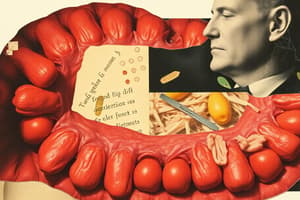Podcast
Questions and Answers
What type of enzyme is secreted by the pancreas that helps in the digestion of fats?
What type of enzyme is secreted by the pancreas that helps in the digestion of fats?
- Amylase
- Maltase
- Protease
- Lipase (correct)
Hydrochloric acid is secreted by the pancreas to aid digestion.
Hydrochloric acid is secreted by the pancreas to aid digestion.
False (B)
What is the substrate for amylase?
What is the substrate for amylase?
Starch
The organ that secretes maltase is the __________.
The organ that secretes maltase is the __________.
Match the enzymes to their functions:
Match the enzymes to their functions:
Which of the following substances, besides enzymes, are important for digestion in the alimentary canal?
Which of the following substances, besides enzymes, are important for digestion in the alimentary canal?
Pepsin is secreted by the pancreas.
Pepsin is secreted by the pancreas.
Name one product of digestion that involves the enzyme pepsin.
Name one product of digestion that involves the enzyme pepsin.
The ____ are the organs where pepsin is secreted.
The ____ are the organs where pepsin is secreted.
Match the following enzymes with their respective products of digestion:
Match the following enzymes with their respective products of digestion:
Study Notes
Human Alimentary Canal and Digestion
- The human alimentary canal consists of various organs that contribute to the digestion process.
- Enzymes play a crucial role in breaking down food substances, with different organs secreting specific enzymes.
Enzymes and Their Functions
- Amylase: Secreted by the salivary glands, it breaks down starch into maltose.
- Lipase: Secreted by the pancreas, it acts on fats to produce fatty acids and glycerol.
- Pepsin: Released in the stomach, specifically from gastric glands, it digests proteins into peptides.
- Maltase: Acts in the small intestine, converting maltose into glucose.
Hydrochloric Acid in Digestion
- Hydrochloric acid (HCl) lowers the pH in the stomach, providing an acidic environment optimal for pepsin activity.
- It helps in killing harmful bacteria ingested with food and assists in the absorption of certain nutrients.
Additional Digestive Substances
- Bile salts: Aid in emulsifying fats for easier digestion.
- Bicarbonate ions: Neutralize stomach acid when chyme enters the small intestine.
Importance of Lactase in Infants
- Lactase is essential for digesting lactose present in breast milk, ensuring infants receive adequate nutrition.
- Without lactase, lactose remains undigested, leading to gastrointestinal discomfort.
Symptoms of Diarrhea
- Common symptoms include frequent watery stools, dehydration, abdominal cramps, and nausea.
- Diarrhea can result from undigested lactose due to lack of lactase.
Chemical Digestion of Large Molecules
- Large insoluble molecules must be broken down to facilitate nutrient absorption in the small intestine.
- Soluble products resulting from digestion can be easily absorbed through the intestinal lining.
Role of Protease Enzymes
- Enzyme A and enzyme B function at different pH levels within the alimentary canal.
- Protease A may function optimally in an acidic environment, such as the stomach, while Protease B may work better in the neutral to alkaline conditions of the small intestine.
- Understanding their pH preferences aids in predicting their roles in protein digestion throughout the alimentary canal.
Studying That Suits You
Use AI to generate personalized quizzes and flashcards to suit your learning preferences.
Related Documents
Description
Test your knowledge on the human alimentary canal and the various enzymes involved in digestion. This quiz covers key functions of enzymes like amylase, lipase, and pepsin, as well as the role of hydrochloric acid in maintaining optimal digestion. Dive into the essentials of how our body processes food!



